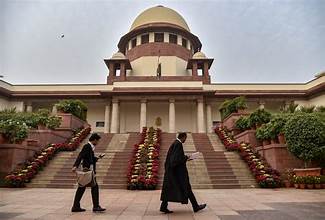


In a point of interest judgment, the Incomparable Court of India ruled that the physical or virtual nearness of an Indian life partner is obligatory for preparing an Abroad Citizen of India (OCI) application by a outside national, indeed in case the couple is offended. This choice underscores the significance of guaranteeing the realness of relational unions in cases including remote nationals looking for OCI status.
Background of the Case
The case included an Iranian national who hitched an Indian man in 2009. Their relationship afterward weakened, and in 2020, the lady connected for an OCI card. In any case, her application confronted a barricade when she was educated that her repelled husband's nearness was required to handle her ask. Challenging this necessity, the lady drawn closer the Delhi Tall Court, which at first ruled in her favor, considering the request on the repelled husband's nearness as self-assertive.
The Central Government, opposing this idea with the Tall Court's choice, offered to the Preeminent Court, driving to the current judgment.
Supreme Court’s Ruling
A three-judge bench comprising Justices Hrishikesh Roy, Sudhanshu Dhulia, and SVN Bhatti clarified the legal position regarding the requirement of the Indian spouse's presence. The Court referred to Para 21.25(vi) of the Visa Manual, 2021, which mandates that the Indian spouse must be present for an interview to verify that the marriage is genuine and not one of convenience or a sham.
This ruling was a response to the Delhi High Court's earlier decision, which the Supreme Court found to lack any "legal basis." The apex court pointed out that under Section 7A(1) of the Citizenship Act, 1955, the registration of an OCI card by the Central Government is "subject to such conditions, restrictions and manner as may be prescribed."
The Court emphasized that:
"In the absence of any challenge to the visa manual or the checklist, and ignoring the procedure in place, the High Court in the impugned judgment erred in granting the relief of dispensing with the requirement of physical/virtual presence of the spouse."
The Supreme Court further critiqued the High Court for labeling the requirement as arbitrary:
"The physical/virtual presence of the spouse and other conditions are also to be satisfied by an applicant as is provided under the Citizenship Act 1955, the checklist, and the Visa Manual for which even a declaration by the husband may be necessary."
Discretionary Power of the Central Government
However, the Supreme Court also acknowledged the Central Government's discretion under Section 7A(3) of the Citizenship Act. The Court noted that in special circumstances, the government could decide to process the OCI application without insisting on the estranged spouse's presence.
The judgment stated:
"The present order will not come in the way of the Central Government to consider if any special circumstances exist for consideration of the respondent’s (woman-applicant) application and it will then be open for the respondent to make good her case."
This nuance allows for flexibility in situations where the estranged spouse might be uncooperative or unreachable, as was argued by the respondent in this case.
Conclusion
The Supreme Court's ruling provides clarity on the procedural requirements for OCI applications involving foreign spouses. By upholding the need for the Indian spouse's presence, the Court aims to maintain the integrity of the process and prevent fraudulent marriages from gaining legal benefits. However, by allowing the possibility of exceptions in special circumstances, the Court also ensures that genuine cases are not unfairly penalized.
This judgment sets a crucial precedent for future cases, balancing the need for stringent checks with the potential for compassion in complex marital situations.
TAGS: Supreme Court OCI application Indian spouse estranged spouse Visa Manual 2021 physical presence virtual presence Citizenship Act 1955 Section 7A Delhi High Court Central Government sham marriage legal precedent special circumstances.